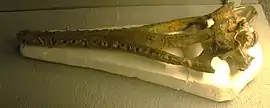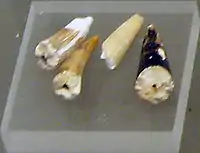Thoracosaurus
Thoracosaurus is an extinct genus of eusuchian crocodylomorph which existed during the Late Cretaceous and early Paleocene. The animal is usually regarded as a gavialoid crocodilian,[1] though the phylogenetic study published by Lee & Yates (2018) suggests that it might have been a non-crocodylian eusuchian.[2] The genus contains the species Thoracosaurus neocesariensis in North America[3] and what is either Thoracosaurus isorhynchus or T. macrorhynchus; a recent review [4] argues that T. macrorhynchus is a junior synonym of T. isorhynchus, but it is unclear whether the type of T. isorhynchus allows differentiation of European and North American Thoracosaurus; if not, then T. isorhynchus would be a nomen dubium. A number of species have been referred to this genus, but most are dubious.[1]
| Thoracosaurus | |
|---|---|
 | |
| Thoracosaurus isorhynchus skull | |
| Scientific classification | |
| Kingdom: | Animalia |
| Phylum: | Chordata |
| Class: | Reptilia |
| Order: | Crocodilia |
| Superfamily: | Gavialoidea |
| Genus: | †Thoracosaurus Leidy, 1852 |
| Species | |
Thoracosaurus scanicus was a fairly large gavialoid, with a length of more than 4.4 m (14.4 ft) and a 55 cm skull.[5]
 Thoracosaurus sp. teeth at the Geological Museum, Copenhagen
Thoracosaurus sp. teeth at the Geological Museum, Copenhagen
References
- Brochu, C. A. (2006). "Osteology and phylogenetic significance of Eosuchus minor (Marsh, 1870) new combination, a longirostrine crocodylian from the Late Paleocene of North America". Journal of Paleontology. 80 (1): 162–186. doi:10.1666/0022-3360(2006)080[0162:OAPSOE]2.0.CO;2.
- Michael S. Y. Lee; Adam M. Yates (2018). "Tip-dating and homoplasy: reconciling the shallow molecular divergences of modern gharials with their long fossil record". Proceedings of the Royal Society B: Biological Sciences. 285 (1881): 20181071. doi:10.1098/rspb.2018.1071. PMC 6030529. PMID 30051855.
- Page 125; A study of fossil vertebrate types in the Academy of Natural Sciences of Philadelphia: taxonomic, systematic, and historical perspectives Issue 16 of Special Publication Series, Academy of Natural Sciences (Philadelphia, Pa.) By Earle E. Spamer, Edward Daeschler, L. Gay Vostreys-Shapiro. Academy of Natural Sciences, 1995 ISBN 0-910006-51-2 ISBN 978-0-910006-51-4
- Brignon, A. (2017). "The collecting of fossil vertebrates in Mont-Aimé (Marne, France) by the Baron de Ponsort (1792–1854)". Bulletin d'Information des Géologues du Bassin de Paris. 54 (3): 20–44.
- "Archived copy". Archived from the original on 2012-02-08. Retrieved 2012-02-08.CS1 maint: archived copy as title (link)